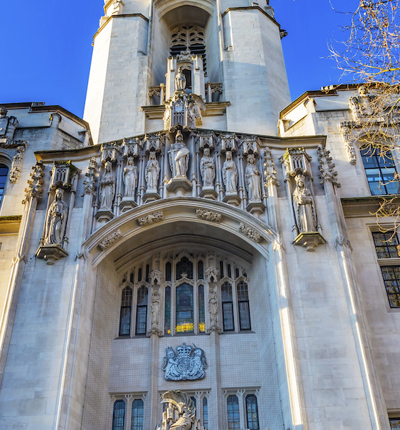
Supreme Court confirms Home Office falsely imprisoned people by imposing unlawful curfews
Human rights solicitor Stephanie Hill discusses the recent Supreme Court judgment in R (on the application of) Jalloh v Secretary of State for the Home Department, and its impact for those subjected to curfews under immigration law.
Posted on 30 March 2020
A few weeks ago, the Supreme Court handed down judgment confirming that a curfew imposed by the Home Office, requiring a claimant to stay at home for eight hours a day, was a “false imprisonment” under common law. The judgment was long awaited, but now feels extremely timely, beginning as it does with a reminder of how highly we prize the right to liberty: R (on the application of) Jalloh v Secretary of State for the Home Department [2020] UKSC 4.
This is an important judgment which will have a significant impact on the lives of many people, and also comes as a welcome clarification of the law of false imprisonment.
The claimant, Mr Jalloh, had been detained by the Home Office under immigration powers from April to October 2013, as the Home Office were seeking to deport him. Like many of those detained by the Home Office, he was not deported but was instead released from detention, having been granted bail by a judge of the First-tier Tribunal. Upon his release, the Home Office imposed a curfew requiring him be at home from 11pm to 7am every day, under threat of a fine or six months in prison.
Under the Immigration Act 1971, the Home Office were permitted to impose restrictions or bail conditions on individuals without immigration status.
One of their key powers, paragraph 2(5) of schedule 3 to the Immigration Act 1971, included the power to impose restrictions on an individual’s residence, employment or to require them to report regularly to the Home Office.
Unlike bail in the criminal courts, these conditions are imposed not because the individual has been accused of a crime but because they lack immigration status. Home Office conditions can remain in place indefinitely, unless the person regularises their status or leaves the country.
For many years, the Home Office relied on paragraph 2(5) to impose curfew conditions, requiring individuals to remain at home for certain hours of the day, monitored with an electronic tag.
But in 2016, the Court of Appeal held that “the clearest legislative authority” was needed for a requirement of this nature and that paragraph 2(5) did not provide that. Any such curfews were therefore unlawful: R (Gedi) v Secretary of State for the Home Department [2016] EWCA Civ 409.
The issue before the Supreme Court in Jalloh was whether or not the unlawful curfew constituted a “false imprisonment”, a centuries old common law tort which can result in compensation.
In a unanimous judgment from Lady Hale, the Supreme Court completely rejected the Secretary of State’s submissions that the curfew was not an imprisonment:
“There can be no doubt that the claimant’s compliance was enforced. He was wearing an electronic tag which meant that leaving his address would be detected. The monitoring company would then telephone him to find out where he was. He was warned in the clearest possible terms that breaking the curfew could lead to a £5,000 fine or imprisonment for up to six months or both. He was well aware that it could also lead to his being detained again under the 1971 Act. All of this was backed up by the full authority of the State, which was claiming to have the power to do this. The idea that the claimant was a free agent, able to come and go as he pleased, is completely unreal.”
The Secretary of State also argued that the common law concept of imprisonment should now be aligned with the more nuanced concept of deprivation of liberty protected by article 5 of the European Convention on Human Rights. Lady Hale rejected this attempt as a “retrograde step”.
The amount of compensation for false imprisonment depends on the individual facts of each case. Mr Jalloh was awarded £4,000 for his eight hour curfew, which lasted over two years. Many believe this to be too low, but the award was upheld by the Court of Appeal and not considered by the Supreme Court.
The Court of Appeal in Gedi and the Supreme Court in Jalloh were concerned with unlawful curfews imposed under the Immigration Act 1971. These powers were revoked in January 2018, when the system of immigration bail was overhauled and replaced with the Immigration Act 2016. It remains to be determined by the Courts whether the 2016 Act includes the power to impose a curfew.
I have acted for several clients in challenging curfew conditions under both the old and new regimes and in securing compensation.
The Supreme Court judgment is particularly welcomed because there will be many other people in the UK in similar positions to Mr Jalloh, who may have been subjected to an unlawful curfew. It is hoped that the clear words of the Supreme Court will encourage potential claimants to come forward and challenge their curfews if they feel they are unlawful.


